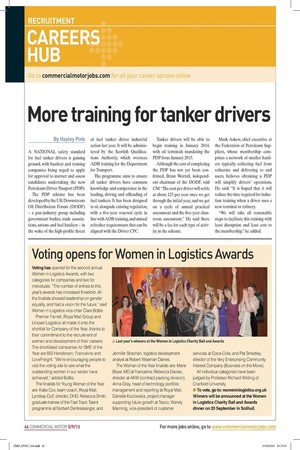More training for tanker drivers By Hayley Pink
Page 38

If you've noticed an error in this article please click here to report it so we can fix it.
A NATIONAL safety standard for fuel tanker drivers is gaining ground, with hauliers and training companies being urged to apply for approval to instruct and assess candidates undertaking the new Petroleum Driver Passport (PDP). The PDP scheme has been developed by the UK Downstream Oil Distribution Forum (DODF) — a pan-industry group including government bodies, trade associations, unions and fuel hauliers — in the wake of the high-profile threat
of fuel tanker driver industrial action last year. It will be administered by the Scottish Qualifications Authority, which oversees ADR training for the Department for Transport.
The programme aims to ensure all tanker drivers have common knowledge and competence in the loading, driving and offloading of fuel tankers. It has been designed to sit alongside existing regulation, with a five-year renewal cycle in line with ADR training, and annual refresher requirements that can be aligned with the Driver CPC.
Tanker drivers will be able to begin training in January 2014, with oil terminals mandating the PDP from January 2015.
Although the cost of completing the PDP has not yet been confirmed, Brian Worrall, independent chairman of the DODF, told CM: "The cost per driver will settle at about £25 per year once we get through the initial year, and we get on a cycle of annual practical assessment and the five-year classroom assessment." He said there will be a fee for each type of activity in the scheme.
Mark Askew, chief executive at the Federation of Petroleum Suppliers, whose membership comprises a network of smaller hauliers typically collecting fuel from refineries and delivering to end users, believes obtaining a PDP will simplify drivers' operations. He said: "It is hoped that it will reduce the time required for induction training when a driver uses a new terminal or refinery.
"We will take all reasonable steps to facilitate this training with least disruption and least cost to the membership," he added.









































